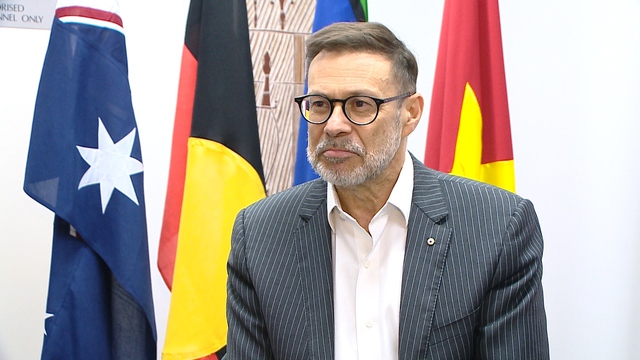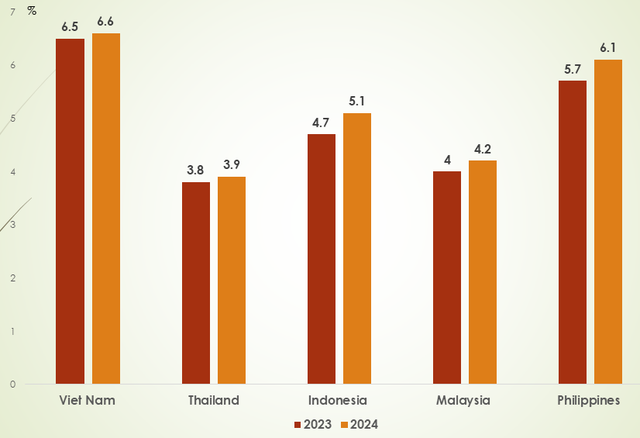Australian Ambassador: Viet Nam’s socio-economic achievements are remarkable
VGP - Viet Nam’s socio-economic achievements are remarkable and they are testament of the organization of the Government and the will of the people, underlined Australian Ambassador to Viet Nam Andrew Goledzinowski.

Australian Ambassador to Viet Nam Andrew Goledzinowski - Photo: VGP/Quang Thuong
In his interview with the VGP, the diplomat said that throughout the COVID-19 pandemic, Australia has worked side-by-side with Viet Nam, supporting the COVID-19 vaccine rollout and focusing on economic recovery.
In 2022, the nation's GDP grew at 8.02 per cent year-on-year, placing it at the front of Southeast Asian peers. Last year, the country consistently ranked as one of the top two countries in Nikkei's COVID-19 recovery index and was also ranked as the fifth most open market in Asia, he noted.
In 2023, the outlook for Viet Nam's growth is positive. Currently, the World Bank (WB), Asian Development Bank (ADB) and International Monetary Fund (IMF) are predicting strong growth of 6.3, 6.5 and 5.8 percent, respectively, which are close to the Government's own target (6.5 percent).
However, in the first quarter of the year, the growth dropped to 3.32 percent. Economic management challenges are intensifying as global headwinds bite deeper and domestic economic issues (especially in the real estate and corporate bond markets), he said, adding that it requires an increase in the government attention.
Australia is proud of its record in supporting Viet Nam's economic development and looks forward to continuing to partner with Viet Nam to support its prosperity, especially through growing trade and investment relationship, the Ambassador shared.

Viet Nam continues to lead the top five largest economies in Southeast Asia with its GDP projected at 6.5% in 2023 and 6.6% next year, according to the Organization for Economic Co-operation and Development (OECD)’s report released in early April
Viet Nam needs to maintain progress of economic reform
Referring to the Government's efforts in boosting manufacturing and production and reducing business costs, Andrew Goledzinowski said that Viet Nam's business environment has shown steady improvements as the country has very successfully implemented its market reform agenda over the last 35 years (since Doi moi).
The nation's active approach to trade integration has been a key enabler in this regard, including Viet Nam's investment chapter commitments, which has provided the stability required for the country to become one of the most attractive foreign investment destinations in the region.
Viet Nam has also shown improvements on key metrics such as corruption reduction, which is very important in terms of business transparency and ease of doing business in the country, he said.
Furthermore, the Government's decision to reduce the value-added tax (VAT) from 10 percent to 8 percent is a good decision, which may help reduce the costs for business and attract more investment from overseas into Viet Nam.
"If the country is to reach its objective of becoming a fully developed economy by 2045, it has to get rich before it gets old, and that means maintaining the progress in terms of economic reform", suggested the Ambassador.
He stated that most of the investor community would like to see more reforms in a number of areas and the opening of some sectors that are not really so available to the international community.
Mining, for example, he said, adding that Australia is one of the great mining countries, but the country finds it very hard to get companies to come into Viet Nam for exploration because the legal framework is not there.
The Ambassador underlined the importance of Viet Nam's outward investment licensing regime for building the nation's domestic economy and supporting investment links.
Through international diversification, including investing in markets like Australia, Vietnamese businesses can secure their value chains and become more competitive as suppliers to global manufacturers in Viet Nam, he added.
Australian Ambassador to Viet Nam Andrew Goledzinowski talks about Viet Nam’s efforts in boosting economic rebounds in the post-COVID-19 period
Viet Nam, Australia unlock more bilateral trade
Regarding the role of bilateral trade in the two nations' relationship, the Ambassador said that the growth in the relationship between the two countries over the past 50 years has been remarkable.
The bilateral trade relationship has continued to flourish, even through recent challenges, with Australia becoming Viet Nam's 7th largest trading partner last year (from 14th in 2020).
The two-way trade flows have reached record highs with AUD 22.1 billion in 2022 (up 40 percent from a year before).
Viet Nam ranked world's 15th most populous country as population hit 100 million while Australia's economy has become the 12th-largest in the world. The good thing is that the two economies are very complimentary, stated the Ambassador.
The secret to the success in bilateral trade is that although the two nations are very close geographically, the industrial composition is very different and climates are very different.
Australia has been a supplier of services and raw materials that Vietnamese exporters need, and high-quality Vietnamese products are also popular in Australia. This means that Australia and Viet Nam rarely produce the same products, rarely offer the same services, said the diplomat.
Both sides eye to elevate relations to a Comprehensive strategic partnership, he noted, adding that the Comprehensive strategic partnership will strengthen Australia in Viet Nam's cooperation in areas of existing strength, including economic issues, strategic and defense policy and skills and innovation.
The diplomat expressed his delight on the pioneering role Australia has played supporting Viet Nam's economic growth since the earliest period of the nation's opening in the late 1980s and early 1990s.
The Royal Melbourne Institute of Technology (RMIT) was the first foreign university, ANZ was one of the first international banks, and Telstra built the first satellite ground stations and laid the first undersea telecommunication cable, helping to link Viet Nam with the world.
An Australian firm also helped Viet Nam establish the first 500 kV high-voltage transmission line, connecting the power system between North and South and creating the backbone of the modern electricity grid.
The Ambassador expressed his hope that two-way investment will soon become an even more important part of the Viet Nam-Australia story, to the great benefit of both nations./.
